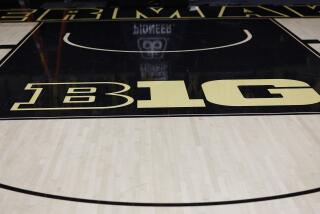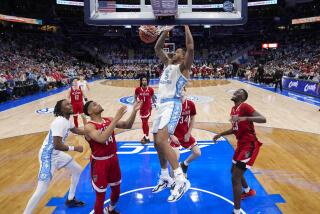During March Madness, it’s never business as usual
- Share via
Lonnie Giamela received a phone call last year, just before the start of the NCAA tournament, from the owner of a manufacturing plant in North Carolina.
A labor lawyer from Los Angeles, Giamela knew immediately this meant basketball business.
The plant of 100 employees, located in a hoops-crazed region, feared the start of the tournament might drain worker productivity and lead to profit loss.
The company decided to block all CBS-affiliated websites proliferating NCAA distraction action but wanted a plan to prevent a revolt.
Giamela, a partner at the firm of Fisher & Phillips LLP, suggested alternating work breaks and putting a television in the game room.
“Everybody loved it,” Giamela said.
This is the week push comes to shove on the court and, possibly, in your cubicle.
Workers across America, as you read this, are rehearsing their scratchy-throat voices. A recent Yahoo survey reported 14% of college basketball fans said they have called in sick during the NCAA tournament.
Some had the foresight to plan vacations this week; others are left to their own mobile devices to navigate March’s murky workday madness.
The worst exploitation-pod period is the first Thursday and Friday, when much of the bracket-busting is during midday work hours. Even labor lawyers who advise employers on policy and practices become caught up in the action.
Giamela is a Georgetown law school graduate whose cellphone might go straight to voicemail Friday when the Hoyas play Belmont in a Midwest Regional game.
“Can I plead the Fifth [Amendment]?” he joked.
In simpler technological times, when the World Series was played during the day, kids and workers devised creative schemes to steal a few innings on company or school time. Some sixth-grade boys in Detroit were overcome with exotic diseases when the Tigers made the 1968 World Series.
More recently, most championship sporting events have been moved to prime time.
The annual exception is the NCAA tournament, which has grown in daytime popularity as soap operas die off and work computers and hand-held devices can provide real-time access to the event.
Employers have long scrambled for ways to deal with company NCAA pools, which, technically, are illegal.
Giamela acknowledges the law is largely unenforceable but suggests companies can avoid problems by sponsoring pools that don’t involved monetary payouts. “A $50 gift certificate, that’s fine,” he said.
The more vexing workplace problems associated with the NCAA tournament are now Twitter, Facebook, iPhones and live streaming.
Giamela estimates “one-third” to “two-fifths” of his clients block websites that show the NCAA tournament.
A recent survey of 500 information technology professionals conducted for Modis, an IT staffing firm, found that four in 10 monitor employees who try to access March Madness on their computers.
Four in 10 of the IT pros also said content from the NCAA tournament had the potential to slow down, or shut down, company bandwidth.
Last year, an estimated 10.3 million hours of streaming video were consumed.
An MSN survey revealed that fans planned to dedicate at least one hour of their workday to the first two days of the tournament. Challenger, Gray & Christmas, an outplacement firm, estimated 2.5 million workers will spend an average of 90 minutes a day watching the tournament.
Based on average private-sector earnings of $23.29 per hour, Challenger estimates employers will pay distracted workers an estimated $175 million over the first two days of the tournament.
Is this really a problem, though, in a multitrillion-dollar economy?
“I would say, in the macro sense, it’s not,” Giamela said. “It’s more a nuisance factor than a significant drain on economic resources.”
Some companies are trying to take advantage of the situation.
Hooters covets your midday business so badly that during the first rounds of the NCAA tournament it promises (sort of) to get you out of work.
In a campaign called “Hooters National Hooky Day,” a “Nurse Ashleigh” asks you to submit your symptoms — basketball fever, dribbling dementia, hoops hysteria — in exchange for a doctor’s note.
The excuse is also good for a free appetizer — but the fine print points out if you are dumb enough to hand the note to your boss or human resources, “we’d also suggest you start looking for a new job.”
Alexis Aleshire, the company’s public relations director, says no companies have complained to her about Hoosters’ campaign to siphon away workers.
“Our hope is that they would not try to hire employees who would be using our fake doctor’s notes,” she said.
The NCAA tournament, some might suggest, could not be coming at a worse time for a country crawling out of a recession. But its impact on the economy is actually a drop in the basketball bucket.
John Challenger, chief executive of Challenger, Gray & Christmas, says his company conducts its annual survey mostly to address how dramatically the workplace has changed.
“It used to be companies thought about production by hours worked,” Challenger said. “You worked 9 to 5. You clocked out. That day is long gone. Today, computers on the desk give us access to an extra amount of information and activities, whether it’s shopping, reading the paper, playing poker, or filling out an NCAA pool.”
Challenger said employers should look at the big picture. Although access to the tournament in the workplace has increased, so has work outside the standard workweek.
“We take Blackberrys and iPhones to work and on vacation,” he said. “If you were to measure production in lost hours at 175 million in two days, we think that’s a good buy. Employers ought to be embracing this.”
Many companies are adapting to the NCAA-workplace issue. A study by OfficeTeam, a staffing services company, reported 57% of managers were fine with employee group events tied to the tournament.
A separate 2010 survey reported 41% of managers believed the tournament had a positive impact on the workplace.
Giamela encourages employers to put out a mass email before the tournament explaining company procedures and protocol.
Los Angeles employers, Giamela says, should catch an economic break this year with Long Beach State as the area’s only NCAA qualifier.
“I would hypothesize that productivity during this March Madness will be greater than years past because of the absence of USC and UCLA,” he said.
It is Giamela’s job to help management manage its way through March Madness, but don’t bother him Friday during the Georgetown game.
Last year, Giamela and 30 former law school colleagues collectively commiserated after Georgetown’s second-round loss to Virginia Commonwealth.
“We all went on Facebook afterward,” he said. “Thirty different law offices across the country. At 800 bucks an hour, imagine the drain on the law firms. . . .”
More to Read
Go beyond the scoreboard
Get the latest on L.A.'s teams in the daily Sports Report newsletter.
You may occasionally receive promotional content from the Los Angeles Times.











